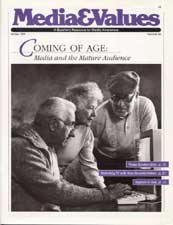How does Hollywood Handle Ageism?
|
This article originally appeared in Issue# 45
|
A conversation with two industry veterans: Dorothea and Dan Petrie
Editor's Note: Is there ageism in Hollywood? According to a recent report by the Writers Guild of America on employment trends in the mid-1980s, the preference for youthful writers, directors and producers may be increasing even as movies and television feature more older people as primary characters.
In the following interview, Media&Values talks with Dorothea and Daniel Petrie, a Hollywood couple who are both well-known for their production savvy and topflight direction and production credits. Dorothea Petrie produced, among other projects, Foxfire, Love Is Never Silent and Picking Up the Pieces. Daniel Petrie's most recent directorial credits are Cocoon II: The Return, Rocket Gibraltar and Square Dance. In this discussion they ponder the issue of ageism and the influence of maturity on the movies and television we see.
Dorothea: You do sometimes hear, "We'd prefer someone younger for this project," but usually it's more subtle than that. In my opinion, it often seems that younger writers, directors and producers are more comfortable working with people their own age. Sometimes younger people doubt that their seniors are up on what's happening. Often, however, they're uncomfortable about exercising authority over someone older. It's easier to work with your same age peers.
Daniel: When I started out years ago, I remember that too many people were telling me, "Listen, kid, I've been in the business for 25 years, and therefore I know." Just because we've been working longer doesn't mean we're necessarily wiser or more intuitive.
Dorothea: But it does mean that we've faced a number of situations that younger people may not have had the opportunity to work through. On the other hand, I'm aware that I'm not always perceived as current as perhaps a younger producer would be. But different ages, working together, can strike a remarkable balance. I'd like to feel that's why younger executives, directors and crews enjoy working with me. I add a value to a project that can't be bought.
Daniel: Yes, the experience of all stages of life are valuable, not just of youth. The projects I've worked on are about people, not about people of a certain age. But I do feel that the trend is away from ageism and toward a recognition that older people have a unique voice.
Dorothea: That's not to deny that identifying a creative person as older can be restricting. I never answer the question: "How old are you?" — not because I want to deny my years, but because I do not believe numbers reflect age. But numbers do reflect a perception, and that perception may be limiting. I don't believe in limitations at any age.
Daniel: I had that feeling about directing Cocoon II: The Return. At first I wasn't too interested because it was a sequel. Then I read the script and was excited by the relationships and its mystic quality. The first Cocoon posited the idea that it was desirable to escape age and death. The second film questions that and deals much more directly with the value of living in the real world with its trials and tribulations. I would say it's about that and not about aging or death.
Dorothea: Those ideas about human values are also what I look for in a property. Anything that deals with the human condition is of interest. We all grow old, but it's the issues of maturity and not the physical process of aging that relates to our development as human beings.
Daniel: There has been a change in attitude, though. For example, when the first Cocoon came out Twentieth Century Fox issued an edict: "No pictures of old people." Advance publicity focused on the grandson and the other younger characters. They were flabbergasted when they discovered how interested everybody was in 'those old people.' And now many upcoming projects feature older people; it's become a trend.
Dorothea: Of course, I hope that trend will continue. The attitude regarding age isn't new. I remember 25 years ago hearing, "Good heavens, if you want to lose your audience, do a story about old people." But with Cocoon and Foxfire we've seen what an audience a story about older people can generate.
"Between 1969 and 1980 only one percent of network shows featured characters 65 and older. Their omission apparently reflects the sentiment of a market-based, productivity-obsessed culture. Since the elderly are seen as past their prime as productive employees and consumers, they are no longer important enough to dramatic social life to merit major dramatic roles or be used as positive role models in advertisements."
— Lawrence A. Powell and John B. Williamson



